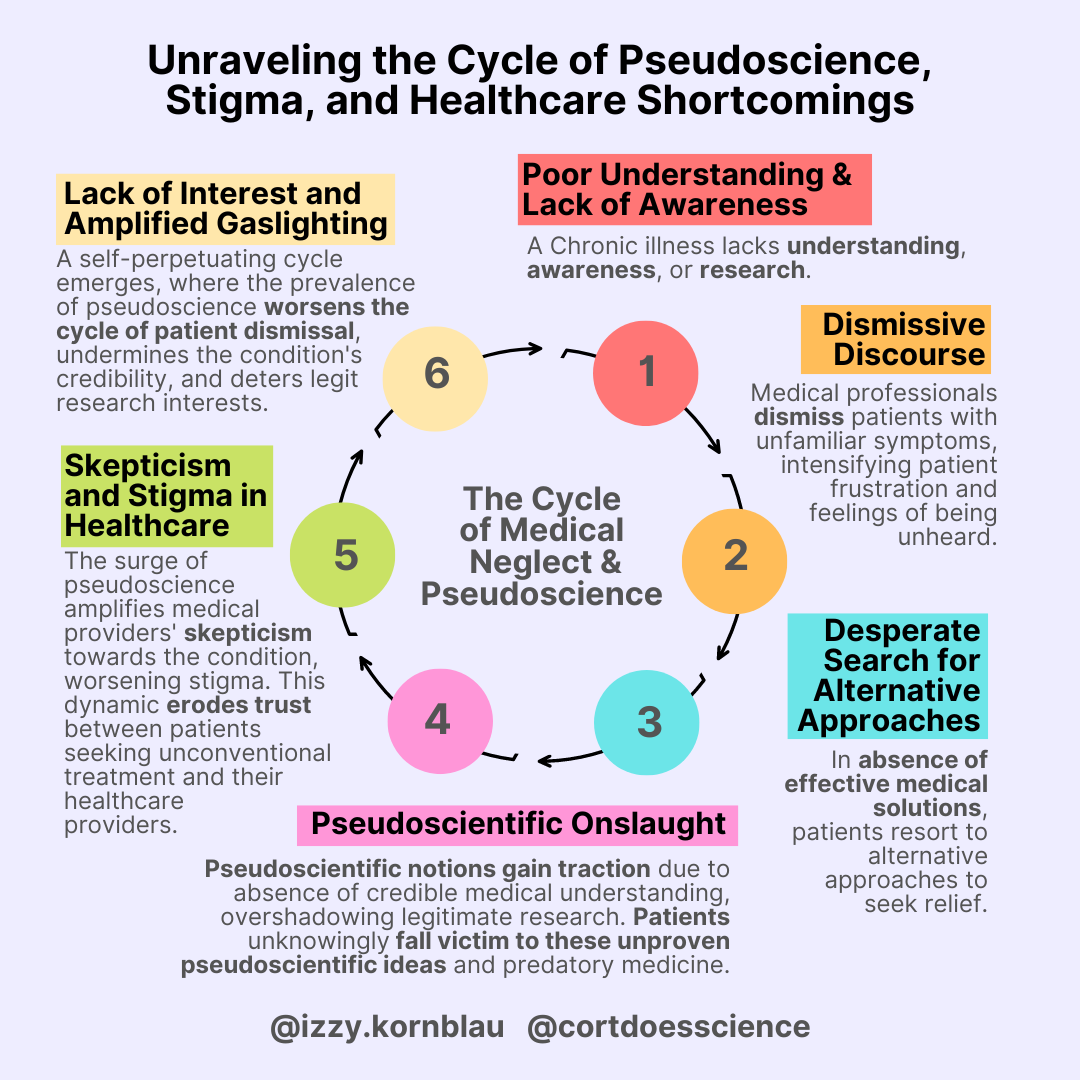Unraveling the Complex Cycle: Pseudoscience, Stigma, and Healthcare Challenges
Exploring dismissal, pseudoscience and misinformation in the chronic illness community with Izzy Kornblau, MS
In the complex chronic illness and rare or misunderstood disease space, an unfortunate cycle can occur, perpetuating the propagation of pseudoscience, fostering stigma, and highlighting the shortcomings of the healthcare system. This can lead to delayed diagnosis, patient frustration, and a lack of trust in medical practitioners. To tackle this topic, I teamed up with my friend, and your favorite genetic counselor with hEDS, Izzy Knorblau (Youtube) (Instagram) for an Instagram post. Check out the Instagram post or keep reading below to learn more about this harmful cycle and what we can do to make an impact.
Poor Understanding & Lack of Awareness
It all starts with a poor understanding of a health condition. Limited research and awareness within both the medical community and the public sphere lead to diagnostic delays, misdiagnoses, and patient frustration. Advocating for increased awareness and medical training through educational campaigns and social media can provide potential solutions, along with enhancing research funding for poorly understood chronic conditions.
Dismissive Discourse
Patients with unfamiliar or complex symptoms often encounter dismissive attitudes from medical professionals when test results appear normal or the condition defies easy explanation. This dismissive discourse not only intensifies patient frustration but also erodes trust in the doctor-patient relationship. To counter this, improving healthcare education to enhance understanding of rare or complex conditions, empathy training for healthcare providers, and fostering open dialogue between patients and healthcare professionals are crucial steps.
Desperate Search for Alternative Approaches
In instances where conventional medical solutions prove ineffective, patients may turn to alternative approaches. The lack of clear guidance on safe and effective alternatives can lead patients down uncertain paths that could potentially be harmful. Developing evidence-based resources, encouraging open dialogue between patients and providers about alternative approaches, and mandating alternative medicine providers to disclose risks are strategies to alleviate this challenge.
Pseudoscientific Onslaught
When credible medical understanding is lacking, pseudoscientific notions often gain ground, overshadowing legitimate research. Patients become vulnerable to exploitation by those capitalizing on pseudoscientific practices and promises of false hope. To combat this, we can strengthen science communication, advocate for accurate medical information on social media platforms, educate the public about discerning credible sources from pseudoscience, and implement regulations to hold providers accountable for exploitative practices.
Skepticism and Stigma in Healthcare
The rise of pseudoscience intensifies medical providers' skepticism towards certain conditions, exacerbating existing stigma and further deteriorating patient-provider trust. Fostering patient-provider collaboration, developing guidelines for healthcare providers to engage constructively with patients exploring unconventional treatments, reducing stigmas, and encouraging curiosity can help bridge the gap between skepticism and understanding.
Lack of Interest and Amplified Gaslighting
A harmful cycle forms as pseudoscience prevalence compounds patient dismissal, eroding the condition's credibility and dampening research enthusiasm. This cycle not only harms patients but also hinders disease advancement of research. Transforming public health efforts, supporting interdisciplinary research, and recognizing that patients should not shoulder the blame for being caught in this cycle is essential to breaking its hold.
Final Thoughts:
Patients are not the sole or main contributors to this cycle; healthcare professionals and researchers play pivotal roles in these issues. Effective change occurs when patients, healthcare professionals, and researchers collaborate to combat issues, reduce stigmas, and promote evidence-based information. It is a systemic problem affecting a variety of conditions, including the EDS, ME/CFS, POTS, MCAS and more. It's critical to hold scientific and healthcare professionals accountable for the information they provide, ensuring they engage and educate patients effectively.
This is not to say that all alternative approaches or providers are harmful. The goal is to encourage a closer examination of information in the chronic illness community, it’s accuracy, risks, and potential harm.
Stay tuned for more discussions on pseudoscience, healthcare challenges and the impact on the chronic illness community. Together, we can forge a path toward a brighter and more informed medical landscape.
More about Izzy:
Izzy Kornblau, MS, is a cardiovascular genetic counselor with hEDS, and recent graduate of the Icahn School of Medicine at Mount Sinai. Izzy uses her genetic counseling knowledge to create educational YouTube videos and Instagram posts about EDS, other genetic conditions, and genetic counseling.
Check out her YouTube channel and Instagram account!





